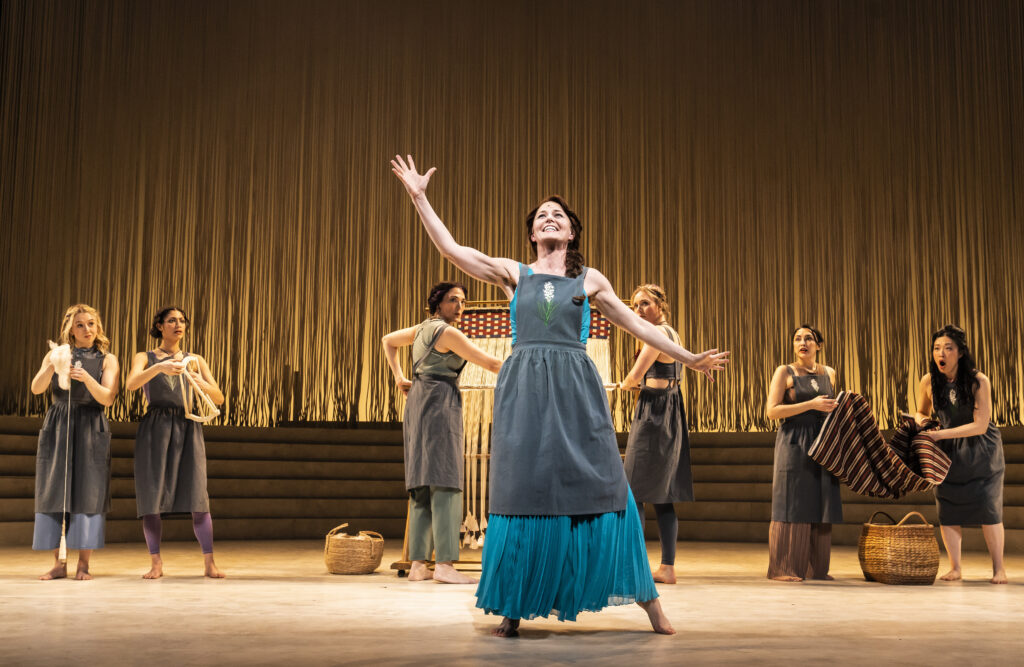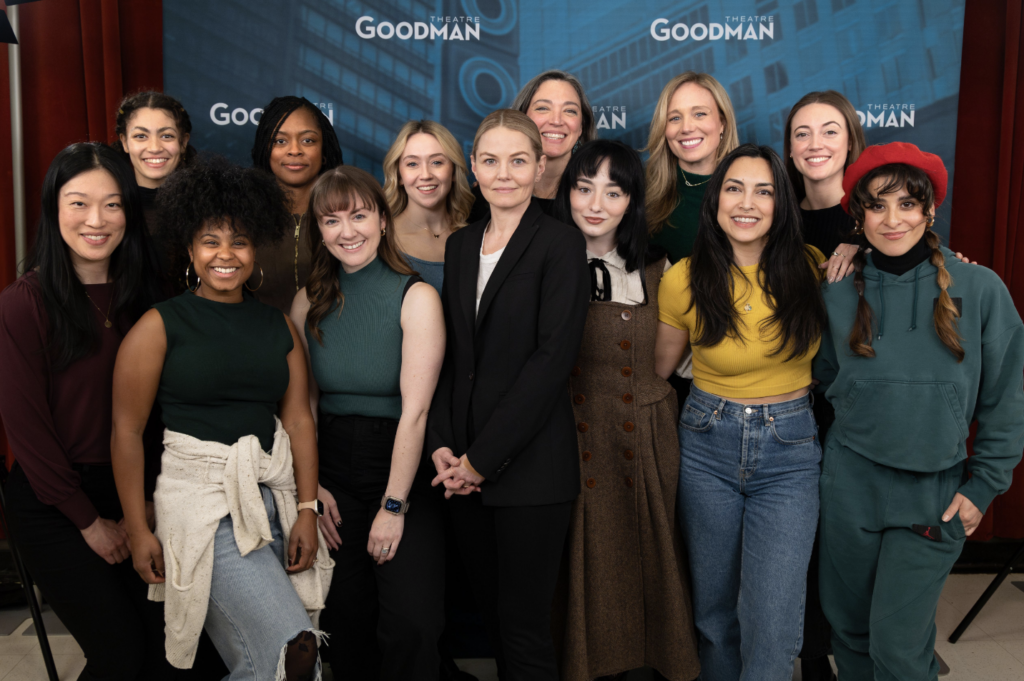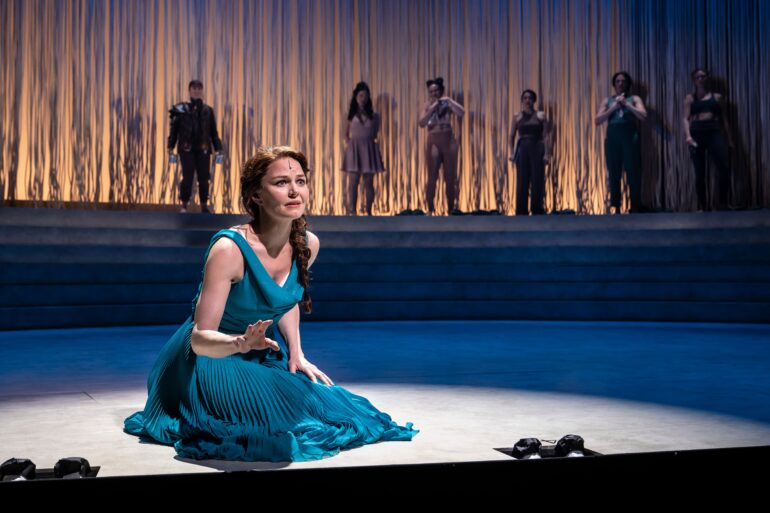The Penelopiad has opened at Goodman Theatre and tells the largely untold story of Penelope, the wife of Odysseus, who waited at home with her 12 maids while her husband — who Homer in the Odyssey called a “man of many twists and turns” — took 20 years to get back to her after the Trojan War. He encountered a few distractions along the way, like Polyphemus the Cyclops, the Lotus-Eaters, and, of course, Circe, a practitioner of magic who turned his boorish crew members into swine. This sorceress kept Odysseus with her for one year, and then Calypso, an immortal nymph, held him for seven more years — though, admittedly, he seems to have been a captive with benefits.
Margaret Atwood, highly regarded Canadian author of The Handmaid’s Tale and other novels, wrote The Penelopiad to throw light on a neglected character in the Homeric epic. After Odysseus left Penelope at home, she was courted by many local suitors whom she put off with a clever ruse: she told them she would choose one of them to marry when she finished weaving a shroud for Odysseus’ father; every night, however, she and her maids would undo all the weaving she had done that day. The suitors were, apparently, having too good of a time — drinking Odysseus’ wine, eating his food and consorting with the maids, sometimes without their consent — to pay much attention.
After Odysseus and Penelope were reunited, the maidens who attended upon Penelope were accused of “disloyalty,” and Telemachus, son of Odysseus, had them hung. Atwood remarked in a 2006 lecture at Emory University that she started thinking about the character of Penelope when she was asked by Canongate Books to participate with other writers to retell some ancient myths in their own words. Atwood remembered being horrified and fascinated when, as a 15-year-old student, she read in The Odyssey that Penelope’s maids were killed at the end of the story. “There was something about that hanging” she said, “that was not only gruesome but suspicious. The evidence that supposedly condemned them just didn’t add up.”

The hanging of the maids comes at the climax of the play, which is performed on a relatively spare stage, within the half circle of on-stage amphitheater seating — evocative of ancient Greek and Roman drama. With this relatively simple staging, elements are flown onstage to simulate, for instance, the huge shroud that Penelope is weaving, which the maids acrobatically unweave while swirling about with aerial silks, an excellent strategy for rendering visually dramatic what could have been the relatively static scene of Penelope, all alone, weaving.
Though Atwood envisioned this story with about 30 characters, the cast has been radically reduced. All roles are played by women who portrayed not only the maids but the suitors who abused them for years. There are times when the maids seem to suggest a Greek chorus, commenting upon and magnifying the actions and emotions at center stage. Spare yet imaginative staging, with lots of song and dance, make this story come alive and starts one thinking about what other secondary characters might deserve a story of their own. Iago from Othello? Phoebe — Holden’s sister — from Catcher in the Rye. Broomhilda from Django Unchained? Why not?
The Penelopiad appealed powerfully to Susan V. Booth, who in 2022 was named Goodman Theater’s eighth Artistic Director in almost 100 years and the first woman to ever hold that position. “When you think about stories of journeys,” Booth said, “there is always someone left at home — and their story tends not to be told. I devoured Margaret Atwood’s funny, subversive novella on a plane ride, immediately struck by the paradigm shift of a story I thought I knew well.”

As reported in the New York Times, Booth’s “arrival at the Goodman comes at a time of widespread turnover in leadership, because of retirement and upheavals around diversity and inclusion. She said one of her first tasks would be to figure out ‘where Chicago is now,’ both artistically and civically, to determine how best to reach the widest audiences possible. She said she also wanted to work with the theater’s artistic collective to continue the Goodman’s tradition of ‘treating classics as if they were new plays.’”
The ”new” perspective The Penelopiad offers is one that suggests a much more rounded portrait of Penelope. We asked Booth what she found to be the salient qualities of Penelope.
“I think she’s wildly compassionate and wildly strategic,” Booth said. “The compassionate part is made manifest with the profound care that she has for these 12 maids that she enlisted to help her stave off the affections of these ever more aggressive suitors. The strategic part is the part that I love the most, the way she fended off these men, which is seldom talked about, but which is wildly inventive.
She says to them, ‘Look, you’re right, surely by now Odysseus must be dead. The one thing I have to do before I choose a husband, is I have to weave a burial shroud for my father-in-law, who is very old. Once I get that done, I will choose.’ And every day she’s diligently at her loom, and they come see her and there she is. What they don’t know is that in the middle of the night, her 12 maids are picking apart the weaving, so it never gets done.”
Over the centuries, Homer has remained an enigma. “Homer” was possibly just a name given as the author of numerous tales told for centuries around Mediterranean campfires. Because many, many storytellers in this oral tradition would have participated in the retelling of the story of Odysseus and Penelope, it’s possible that some parts of the story — like why exactly all the maids were executed — could have been lost in time when storytellers, perhaps eager to get to the end of this classic tale, may have skimmed over some of the “details.” Those possible omissions left space for Atwood to fill in the blanks with her powerful imagination, and it provides Booth with a similar opportunity to complete the story of Odysseus and Penelope.
“We have this idea of the hero’s journey as a completely elastic notion that encompasses all people,” Booth said. “But as soon as it’s Penelope, it’s ‘not relevant.’ Who gets to say what determines who’s a minor character in a story and who’s a major character? These questions are always interesting to me. Telling the story of Odysseus from the point of view of the women left behind felt like an invitation.”

“So often, we relegate people to the margins; we say he or she is not the center of the story, he or she does not command my attention,” Booth said. “The leader commands my attention, the loudest, the brightest commands my attention, but the reality is that every individual in every moment is worthy of our inquiry, is worthy of our interest and compassion. And the thing that just knocked me out about this piece, when I first read it, was how kindly Margaret Atwood moved to the center of the story folks who’ve been relegated to the margins.”
The Penelopiad encourages us, Booth said, “to look to the edges of the story.”
The Penelopiad runs at The Goodman Theatre until March 31. Attending the play is also a great way to celebrate Women’s History Month. Secure your tickets online at the Goodman Theatre.
How to Help:
As a non-profit, 40% of Goodman Theatre’s annual budget comes from charitable contributions. Support the theatre by buying tickets to this or future productions, or make a donation by visiting Goodman Theatre online.

More From Better:
- 31 Best Things to Do in Chicago and the Suburbs This March 2024
- ‘Cosmic Rhythms’: Ballet Meets Astronomy in a New Immersive Experience by Joffrey Ballet and Adler Planetarium
- Art Institute of Chicago’s Civic Wellness Initiative Is Using Art to Help Professionals Enhance Empathy and Communication Skills

David Hammond is Dining and Drinking Editor at Newcity and contributes to the Chicago Tribune and other publications. In 2004, he co-founded LTHForum.com, the 15,000 member food chat site; for several years he wrote weekly “Food Detective” columns in the Chicago Sun-Times; he writes weekly food columns for Wednesday Journal. He has written extensively about the culinary traditions of Mexico and Southeast Asia and contributed several chapters to “Street Food Around the World.”
David is a supporter of S.A.C.R.E.D., Saving Agave for Culture, Recreation, Education and Development, an organization founded by Chicagoan Lou Bank and dedicated to increasing awareness of agave distillates and ensuring that the benefits of that awareness flow to the villages of Oaxaca, Mexico. Currently, S.A.C.R.E.D is funding the development of agave farms, a library and water preservation systems for the community of Santa Catarina Minas, Oaxaca.

